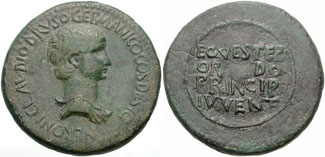This record is provided by CoinArchives, a database of numismatic auction catalogs.
Important copyright information:
The data below is presented by permission of the copyright holder(s). Reproduction is allowed only by authorization from Classical Numismatic Group.
Important copyright information:
The data below is presented by permission of the copyright holder(s). Reproduction is allowed only by authorization from Classical Numismatic Group.
| Classical Numismatic Group > Mail Bid Sale 66 | Auction date: 19 May 2004 |
| Lot number: 1369 | |
| Lot description: NERO, as Caesar. 50-54 AD. Æ Sestertius (28.22 gm). Thracian mint. Struck 51 AD. Estimate $5000 NERO, as Caesar. 50-54 AD. Æ Sestertius (28.22 gm). Thracian mint. Struck 51 AD. Bare-headed and draped bust right / EQVESTER / OR-DO / PRINCIPI / IVVENT in four lines across shield; vertical spear behind. RIC I 108; Von Kaenel, "Britannicus, Agrippina Minor und Nero in Thrakien," SNR 63 (1984), N4 and Tafel 25, 38; BMCRE pg. 195 note; Cohen 99; Gorny & Mosch 117 (14 October 2002), lot 480. See also RPC I pp. 311 and 319 for a discussion of this issue. Choice VF, nice green patina. ($5000) Latin coins (sestertii and dupondii) in the name of Britannicus, Agrippina Jr., and the young Nero have been found localized in the Balkan region, and were most likely struck at a local mint servicing the legions guarding the border. Only four specimens of the sestertius were known to von Kaenel: one in the Berlin Museum, one in the British Museum, one in the Bibliothèque National and a fourth that appeared in Sternberg 12 (18-19 November 1982, lot 543). The missing S C is consistent with a provincial issue not issued under the nominal authority of the Roman Senate. RPC I suggested Perinthus as a possible mint, "if any of them are genuine." Since that volume's publication, more examples from the Balkans have appeared on the market, all of which clearly appear genuine. The princeps iuventutis, or heir-apparent, had been constitutionally recognized under Augustus, who had this title bestowed on his grandsons, Gaius and Lucius Caesars. The ceremonial shield and spear, which the ordo equester presented, attempted to link the heir to the Roman cavalry; the equestrian order by this time, however, had long-since been divested of its military connections. |  |


